All Categories
Featured
Regular vehicle servicing is an essential part of car ownership, however determining just how frequently to schedule these check-ups can in some cases be puzzling. Whether you drive a brand-new vehicle or a high-mileage automobile, remaining on top of maintenance guarantees security, optimal efficiency, and a longer life expectancy for your cars and truck. In this short article, we'll check out the factors that affect solution intervals and just how you can create a timetable that functions for you.

- Producer's Standards: Your Very First Referral Point. Every vehicle comes with an individual guidebook, that includes the maker's preferred service periods. These guidelines are customized particularly to your automobile version and its components. Common recommendations include:
Oil changes: Every 5,000 to 10,000 miles or 6-12 months, depending on whether you make use of traditional or artificial oil. Tire rotations: Every 5,000 to 7,500 miles to make certain even put on and extend tire life. Significant solutions: At turning points like 30,000, 60,000, or 100,000 miles, which may consist of timing belt replacements, coolant purges, and transmission servicing. Adhering to the producer's timetable aids maintain your cars and truck's performance and maintains its service warranty legitimate.
- Driving Problems Matter. Exactly how and where you drive substantially influences how typically your auto needs servicing. Cars utilized under "severe driving conditions" may call for even more regular maintenance. These conditions consist of:
Regular brief journeys under 10 miles. Driving in hefty stop-and-go web traffic. Operating in severe temperatures (hot or cold) Taking a trip on dusty, muddy, or unequal roadways. If any of these put on your everyday commute, consider setting up even more constant oil adjustments and inspections to prevent deterioration. 3. Modern Features: Checking Your Automobile's Health and wellness. Lots of modern-day autos are geared up with onboard diagnostics and maintenance tip systems. These attributes check your car's problem in genuine time and sharp you when it's time for servicing. Take notice of these signals, as they are based on aspects like gas mileage, engine efficiency, and oil condition.
- Seasonal Maintenance: Be Prepared Year-Round. Modifications in climate can impact your cars and truck's performance, so organizing seasonal check-ups is a great practice.
Prior to winter season, ensure your battery, tires, and heater are in good condition to deal with colder temperature levels. Prior to summertime, evaluate your cooling system, air conditioning, and fluids to stop getting too hot. Seasonal maintenance keeps your vehicle reliable and ready for shifting conditions.
- Indicators Your Cars And Truck Requirements Immediate Interest. Occasionally, your auto may require servicing prior to the scheduled period. See for the adhering to indication:
Odd sounds, such as grinding or screeching. Lowered gas performance. Control panel warning lights, including the check engine light. Trouble starting the cars and truck or delaying. Dealing with these problems promptly can conserve you from costly fixings later on.
- Benefits of Remaining Constant. Regular servicing isn't almost following a schedule-- it's an investment in your car's future. It helps:
Maintain you and your guests safe. Maximize fuel efficiency. Prevent costly failures. Prolong the life of your car. Increase resale value by keeping a comprehensive service document. Final thought. Just how frequently should you service your vehicle? The response relies on your car's make, your driving practices, and ecological problems. Adhering to the maker's referrals, adapting to your driving problems, and being mindful of advising indications will assist you stay on track. Regular upkeep isn't just about keeping your vehicle running-- it's about making certain safety, saving money, and appreciating comfort whenever you hit the trail. Deal with your auto, and it will deal with you.
Latest Posts
Explore WyHy Federal Credit Union – Top Benefits for Your Financial Success
Explore Your Financial Partner at WyHy – Key Advantages for Your Financial Success
The Power of Strategic Media Preparation with Complete Circle Advertising
More
Latest Posts
Explore WyHy Federal Credit Union – Top Benefits for Your Financial Success
Explore Your Financial Partner at WyHy – Key Advantages for Your Financial Success
The Power of Strategic Media Preparation with Complete Circle Advertising